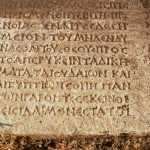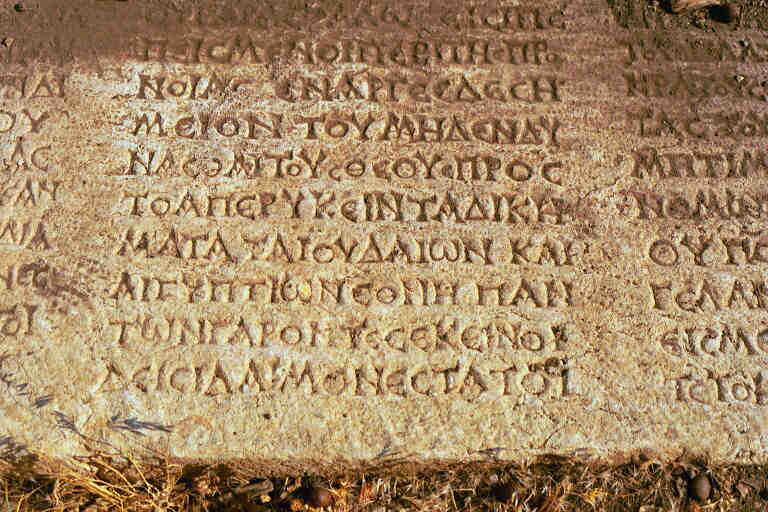Suggestions On Being “Well-Constituted”
 The Inscription from Oenoanda by Diogenes, which is the focus of this excellent and highly-recommend web site, begins with two prominent references to the interesting term “well-constituted”:
The Inscription from Oenoanda by Diogenes, which is the focus of this excellent and highly-recommend web site, begins with two prominent references to the interesting term “well-constituted”:
(1) “Having already reached the sunset of my life (being almost on the verge of departure from the world on account of old age), I wanted, before being overtaken by death, to compose a [fine] anthem [to celebrate the] fullness [of pleasure] and so to help now those who are well-constituted. “
Although it is not entirely clear to me what “well-constituted” is intended to mean, I do have a few suggestions:
First, it is probably fair to say that people who are “well-constituted” either do not suffer, or are capable of recovering, from being numbered among “the majority of [who] people suffer from a common disease, as in a plague, with their false notions about things, [whose] number is increasing (for in mutual emulation they catch the disease from one another, like sheep).” So it would seem that the well-constituted either dismiss, or a capable of dismissing, the false notions about the nature of things that plague the majority.
Second, we see that Diogenes states his earnest desire to labor to assist those who are wasting their lives and confused because they see the human body as “unwarrantably mauled and maltreated by the soul and dragged to things which are not necessary.” Diogenes says he will assist them by showing that “the wants of the body are small and easy to obtain — and the soul too can live well by sharing in their enjoyment — while [the wants] of the soul are both great and difficult to obtain and, besides being of no benefit to our nature, actually involve dangers.” Diogenes even says that he considers it “the responsibility of a good man to give [benevolent] assistance, to the utmost of one’s ability” ….. but ONLY “to those of them who are well-constituted.”
This context implies that the people we must be concerned about are those who are capable of being assisted, and this implies that there are others who are NOT capable of being assisted. Is there precedent in other Epicurean texts for observing that there are some people who are beyond assistance?
Consider PD5: “It is not possible to live pleasantly without living wisely, honorably, and justly. Nor can one live wisely, honorably, and justly without living pleasantly. But those who for any reason do not live wisely, honorably, and justly cannot possibly live pleasantly.” This implies that there are multiple reasons, presumably including both personal mental and physical incapacities and external conditions, which are capable of preventing a person from living wisely, honorably, and justly.
Also consider the following attributed to Epicurus as quoted by Plutarch and translated by Norman DeWitt: “The stable condition of well-being in the flesh and the confident hope of its continuance means the most exquisite and infallible of joys for those who are capable of figuring the problem out.” [cited as Usener 68 in Chapter XII of DeWitt’s Epicurus and His Philosophy]
Doctrine 24. We must not discard any evidence provided by a sense simply because it does not fit our prior conceptions, and we must always distinguish between those matters which are certain and those which are uncertain. We must do this so we can determine whether our conclusions go beyond that which is justified by the actual evidence of the senses. We cannot be confident of our conclusions unless they are justified by actual, immediate, and clear evidence, and this evidence must come from the conceptions of the mind which arise from the five senses, from the sense of pain and pleasure, and from the Anticipations. If we fail to keep in mind the distinction between the certain and the uncertain, we inject error into the evaluation of the evidence provided by the senses, and we destroy in that area of inquiry every means of distinguishing the true from the false.
Doctrine 25. If we consider those opinions which are only tentative, and must await further information before they can be verified, to be of equal authority with those opinions which bear about them an immediate certainty, we will not escape error. For if we do this we overlook the reason for doubt between that which is right and that which is wrong.
Stated another way, we must always keep separate in our minds those things which are certain from those which are uncertain, and we must never consider some hypothetical opinion to be equal in authority to a fact which has been established by clear evidence.
What does this mean in real life? I would suggest that that these principles apply — at a minimum — to those situations where we cross paths with some Tom, Dick, or Harry, who tells us that knowledge is impossible because we cannot trust the senses, or we meet some Abe, Paul, or Mo who tells us that they bring a direct message from the Eternal Creator of the Universe. When these or similar occasions arise, we must not for a moment keep an “open mind” that the contentions of these men could be true. To maintain an open mind when a hypothetical contention violates the clearly established evidence of the senses destroys in that area of inquiry every means of distinguishing the true from the false, and guarantees that we will not escape error. For if we do this — if we keep an “open mind” in the face of clear error – we overlook the reason for doubt between that which is right and that which is wrong.
Thus it appears to me that being “well-constituted” requires at a minimum that we possess both the individual mental and physical capacity, and the individual force of will, to remember and to apply the key concepts of Doctrine 24 and Doctrine 25.

